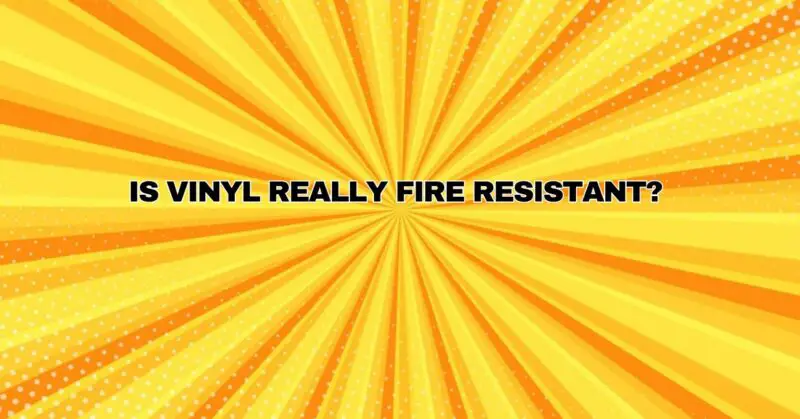Vinyl, celebrated for its analog warmth and nostalgic allure, has been a beloved medium for music enthusiasts and audiophiles for decades. Among the various considerations when it comes to vinyl records, their fire resistance is a topic that occasionally sparks curiosity. In this comprehensive article, we will explore the fire-resistant properties of vinyl, clarify common misconceptions, and provide insights into vinyl’s behavior when exposed to fire or heat.
Understanding the Composition of Vinyl
Vinyl records are primarily made from a type of plastic known as polyvinyl chloride (PVC). PVC is a synthetic polymer consisting of carbon, hydrogen, and chlorine atoms. It is widely used in various applications due to its versatility, durability, and cost-effectiveness.
The Fire Resistance of Vinyl
Vinyl, like many plastics, is not inherently fire-resistant. Instead, its fire resistance depends on several factors, including:
- Ignition Temperature: All materials, including vinyl, have a specific ignition temperature. Vinyl will not ignite unless exposed to temperatures above its ignition point. However, this ignition temperature is significantly higher than what is typically encountered in everyday environments.
- Exposure Duration: The duration of exposure to heat or flame is crucial. Vinyl may burn if subjected to prolonged exposure to high temperatures or an open flame.
- Chemical Additives: The fire resistance of vinyl can vary based on the specific formulation and additives used in its production. Some additives can enhance the flame resistance of vinyl materials.
- Thickness: The thickness of vinyl materials can affect their fire resistance. Thicker vinyl may be more resistant to ignition and burn more slowly than thinner vinyl.
Flame Retardants in Vinyl
To improve fire resistance, vinyl products, including records, may contain flame retardants. Flame retardants are chemical additives that reduce the material’s flammability and inhibit the spread of flames. These additives can help vinyl withstand exposure to heat and open flames to a certain extent.
However, it’s important to understand that vinyl records are not designed or marketed as fireproof or fire-resistant materials. They are intended for regular use, storage, and playback, rather than withstanding extreme heat or flames.
Practical Considerations
In everyday scenarios, vinyl records are not highly flammable materials. They are not prone to spontaneous combustion or ignition under normal conditions. However, vinyl can be damaged or deformed by exposure to excessive heat or an open flame.
Vinyl records should be stored away from direct sources of heat, such as radiators, stoves, or open flames, to prevent warping or damage to the records and their covers. Additionally, vinyl records should be kept in a cool, dry environment to maintain their optimal condition.
Conclusion: Vinyl’s True Nature
In conclusion, vinyl records are not inherently fire-resistant materials, but they are not highly flammable either. Vinyl’s fire resistance depends on factors such as its formulation, thickness, and exposure conditions. While vinyl records are not designed to withstand extreme heat or flames, they are safe for regular use and storage in typical environments.
As music enthusiasts, vinyl collectors, and audiophiles continue to appreciate the analog warmth and timeless appeal of vinyl records, it is essential to handle them with care and take precautions to protect them from potential damage, including exposure to excessive heat. Proper care and storage will ensure that your cherished vinyl collection continues to provide years of listening pleasure without posing significant fire hazards.


